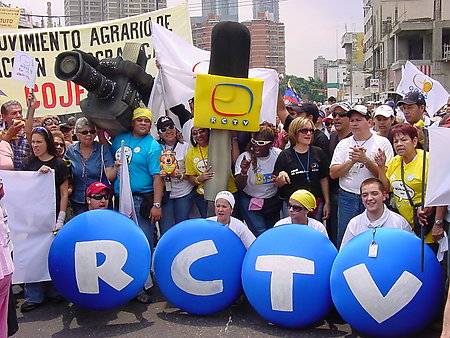WHAT DO VENEZUELANS WANT?
Por Valentina Issa
 For the first 20 years or so of my life I held in my head the notion of a more or less homogenous Venezuelan nation. One that, despite of its patent diversity (in almost every sense possible), was made of people with similar values, views, interests, pursuits, purposes. I believed that precisely in our wonderful diversity laid this common character that made all 20something million inhabitants of the land of Bolivar “Venezuelans”: accepting, non-discriminating, generous, joyous people with the aspiration of having a comfortable, sunny country we could all live in. I used to think that everything I found outrageous, including our current government, everybody else did too. I believed our president had been given a chance to govern, done a terrible job, and so it was time for all of us Venezuelans to open our eyes and stop him. Together, as one. Our shared misfortune and the government’s responsibility for it were so obvious to me!
For the first 20 years or so of my life I held in my head the notion of a more or less homogenous Venezuelan nation. One that, despite of its patent diversity (in almost every sense possible), was made of people with similar values, views, interests, pursuits, purposes. I believed that precisely in our wonderful diversity laid this common character that made all 20something million inhabitants of the land of Bolivar “Venezuelans”: accepting, non-discriminating, generous, joyous people with the aspiration of having a comfortable, sunny country we could all live in. I used to think that everything I found outrageous, including our current government, everybody else did too. I believed our president had been given a chance to govern, done a terrible job, and so it was time for all of us Venezuelans to open our eyes and stop him. Together, as one. Our shared misfortune and the government’s responsibility for it were so obvious to me!
However, as it turns out I was quite wrong (youth can be naïve like that). Many sleepless nights and endless hours of analysis, discussion, work and even campaigning later I see a different image: A highly politically polarized and complexly segmented Venezuela, with at least 5 or 6 sets of sub-countries with different desires and preferences coexisting together in a hectic dynamic of death and electoral matches.
Venezuela has is now a battleground of many contradictions and erratic behavior. I will try my best to paint the picture…
December of 2010: Imagine an awfully un-representative outgoing parliament (composed mostly by pro-government members because of an opposition boycott to the parliamentary elections 5 years before) on its last day of session. Recent elections allowed for a more balanced composition of the parliament and 52% of the voters supported the opposition. Any outgoing parliament in that situation must pack its bags, put everything in order for the newcomers and leave (they’ve been out ruled, right?), but instead, they decided to pass and approve dozens of bills containing all the postulates of a constitutional amendment proposed by the president and rejected by popular vote 3 years before. If you tuned into the parliament’s tv channel you could see the 3 or 4 lonely opposition members of that outgoing parliament in desperation for the sausage-making-like approval of un-consulted laws. Simultaneously, while this was publicly and notoriously taking place, the capital’s baseball stadium was overflowing with fans rooting for the winning team in the season’s finals. Probably some of the fans in the stadium that night had voted against the constitutional amendment in 2007 and disagreed with what was being passed in parliament, but they were completely oblivious in that very beer drinking moment. Some Venezuelans worried about what happened but did basically nothing, some didn’t care, and some didn’t even hear about it.
 Another picture. In may 2007 the government shut down a 50 years old tv station (Venezuela’s oldest and most traditional, RCTV) and with it its popular soap operas and entertaining shows, not just the uncomfortable and critical opinion shows and 10 o’clock news. In December of the same year it tried a referendum for a constitutional amendment, including the possibility of unlimited re-election of all public officials, and lost, partly as punishment for shutting down RCTV according to some analysts. Then, in November 2008 the government looses sensible spaces in regional and municipal elections showing what seemed to be a growing trend for the opposition and a loosing one for the government. The surprise came when in February 2009 the government tried another referendum, this time only focused of approving unlimited re-elections (denied in 2007), and wins. This means that at the end of 2007 Venezuelans did not want unlimited re-elections but in 2009 they did.
Another picture. In may 2007 the government shut down a 50 years old tv station (Venezuela’s oldest and most traditional, RCTV) and with it its popular soap operas and entertaining shows, not just the uncomfortable and critical opinion shows and 10 o’clock news. In December of the same year it tried a referendum for a constitutional amendment, including the possibility of unlimited re-election of all public officials, and lost, partly as punishment for shutting down RCTV according to some analysts. Then, in November 2008 the government looses sensible spaces in regional and municipal elections showing what seemed to be a growing trend for the opposition and a loosing one for the government. The surprise came when in February 2009 the government tried another referendum, this time only focused of approving unlimited re-elections (denied in 2007), and wins. This means that at the end of 2007 Venezuelans did not want unlimited re-elections but in 2009 they did.
Examples like these are varied and large including cases of students hunger striking against the unconstitutional continuation of a government without an active and able president, and Cuban interference with Venezuelan inner matters, at the same time as malls, restaurants and commercial areas are packed with shoppers and people relaxing; more than 20 thousand Venezuelans getting killed on the streets every year in the hands of criminality and polls showing that most Venezuelans do not hold the government responsible it; opposition presidential candidates loosing in areas improved and directly benefited during his work as governor; and finally governments winning elections in a country with more than 3 thousand street protests against it every year.
The truth is, Venezuela is the kind of country where two radically different headlines, showing two radically different country realities, can share the front page of a newspaper on the same day. For example, Justin Bieber’s or Britney Spears’s arrival in Venezuela for a concert with ridiculously expensive tickets at the top of the page, and the horrifying weekend homicide toll at the bottom. But it is also true that in the middle of all the contradictions and contrasts we still share some common grounds: we’re all afraid of the streets at night (except for the criminals, of course, who are also Venezuelans and vote); we all vibrate with joy every time our national football team wins (and if we make it to the 2014 World Cup we will celebrate and cry with passion together); as much as we complain about the country an its dynamics (like I just did with the article) we defend it like animals when foreigners criticize it and we ache for it when we are abroad; we are surprisingly cheerful and have great a sense of humor (too good sometimes); we are generally healthy (criminals might kill us, but not diseases. Plagues that have destroyed populations in other countries we have survived with very little casualties); and we all enjoy to eat a good arepa, the only dish that can be found in virtually every Venezuelan home, from the poorest to the richest. So maybe there is hope of sharing a common view sometime of how we want to live, and not die so much.
- Irán vive días de zozobra – The New York times - 17 febrero, 2026
- Diálogo entre bots, ¿una experiencia religiosa? - 7 febrero, 2026
- Quitar el color en mi celular me hizo apreciarlo más en la vida real – The New York Times - 29 diciembre, 2025
